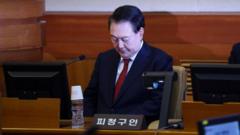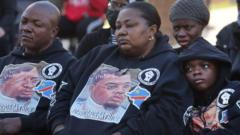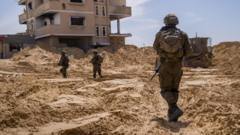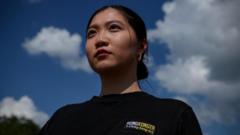As the constitutional court deliberates over Yoon Suk Yeol's impeachment, he claims no involvement in ordering arrests of lawmakers during his controversial martial law declaration. Significant public protests reflect a deeply divided political climate.**
South Korea's Impeachment Trial: President Yoon Denies Martial Law Orders Amid Political Turmoil**

South Korea's Impeachment Trial: President Yoon Denies Martial Law Orders Amid Political Turmoil**
South Korea's suspended president, Yoon Suk Yeol, faces impeachment proceedings while denying allegations related to martial law declarations during a political crisis.**
South Korea's suspended president, Yoon Suk Yeol, made a significant appearance in his ongoing impeachment trial, asserting his innocence regarding claims he ordered the arrest of lawmakers during a controversial declaration of martial law. The proceedings, which began after Parliament voted to impeach him last month, are now under the scrutiny of the Constitutional Court with the potential to permanently remove him from office.
On 3 December, amid allegations of political unrest, Yoon declared martial law, purportedly aimed at combating threats from "anti-state forces," including North Korea. He refuted military commanders' testimonies that he directed them to apprehend lawmakers seeking to overturn this decree. “No,” he firmly responded when questioned about whether he had issued such orders. Yoon insisted that he is a staunch believer in liberal democracy, urging the court to objectively examine all facets of the case.
As Yoon's trial unfolded, security was tight, with police managing large crowds of his supporters who gathered nearby, demanding his release. Tensions escalated last weekend when clashes erupted between law enforcement and Yoon’s backers, some of whom rallied with banners and slogans echoing similar themes to U.S. political movements. Many supporters view Yoon's actions as a necessary defense of democracy against opposition parties they accuse of being sympathetic to communist ideologies.
Critics within the court argued that Yoon's defense team presented contradictory and vague reasoning, asserting that failure to acknowledge responsibility could hinder Yoon’s chances of remaining in office. The trial's outcome will heavily depend on the constitutional court’s decision, requiring at least six out of eight judges to support impeachment for Yoon to be removed.
With protests escalating and the nation confronting palpable economic difficulties, significant public sentiment rallies both for and against Yoon's administration. As the political crisis deepens, South Korea faces pressing challenges, with observers noting implications for consumer and business confidence as the situation develops. The upcoming testimony from former defense minister Kim Yong-hyun, who suggested the martial law order, could further impact the proceedings.



















